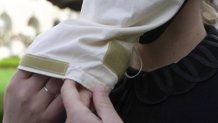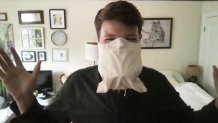In a strange marriage of arts and science, The San Francisco Opera costume department teamed up with doctors from UCSF to create a mask that will allow the company's singers to safely rehearse together -- while greatly diminishing the chances of spreading COVID-19.
The opera's wardrobe team crafted the mask from materials used in making its corsets -- with a billowy shape aimed at allowing ample room for singers to belt out song, while tightly sealing in aerosols that could potentially spread the virus.
"They can sing full-out and rehearse just as if they didn't have a mask on," said Galen Till, the opera's senior costume production supervisor. "But this will protect them, and everyone around them."
The light colored fabric in the mask is multi-layered and fastened over an internal lightweight frame that loops over the ears and ties in the back. It also has a Velcro pouch that unfurls in the front so performers can take a drink.

"We needed to have something that allowed our singers to rehearse in a way that they can't with a regular mask," said Till, donning the mask for a demonstration.
The mask was a culmination of brainstorming sessions between the opera and medical experts from UCSF Medical School who are helping the organization figure out to safely hold live performances. Oddly enough, the design of the mask didn't originate in the opera house -- it came from UCSF -- and the mind of opera-singing surgery professor Dr. Sanziana Roman.
Local
"I had the prototype which I made on my kitchen table and it looked fantastic," said Roman, who tried out the mask by singing it. "What I realized is what we needed was a mask that would be able to allow individuals to come together as a group and rehearse and be in the same room together."
The opera's costume designers took Roman's homemade prototype and tweaked it to make it more attractive, comfortable and durable. Roman then sent it to an engineering professor at U.C. Davis who devised a study of its effectiveness using musicians from the Sacramento area. The tests revealed the mask did exactly what Roman hoped it would.
Get a weekly recap of the latest San Francisco Bay Area housing news. >Sign up for NBC Bay Area’s Housing Deconstructed newsletter.

"So it's quite protective of aerosols produced by individuals," Roman said, "but it's also quite protective of inhaled aerosols."
The mask was finally given the ultimate test drive with singers from the Adler Fellows opera group in San Francisco. Adler Fellow Chris Ogelsby, who wasn't part of the initial trial, has practiced in the mask, finding it to be perfectly comfortable to sing in -- if one has to sing in a mask.
"They have a great structure within them that keeps them from actually touching your nose or your mouth as you sing," Ogelsby said, before slipping on the mask and slipping into song. "These allow us to get closer together, sing together without the excess possibility of spread."
The opera plans to employ the masks in April as it rehearses for a production of The Barber of Seville which will be performed outside in the Marin County Civic Center later that month. While the performers will wear the masks during indoor rehearsals, they won't wear them on the outside stage. Till said they may use the masks backstage so performers can safely mingle.
"We're really excited," Till said. "It'll be the first time we've been on stage since the pandemic happened."
Roman said she's seen opera companies in Japan and New York using versions of a signing masks far different from hers. She and the team have since patented the mask design -- with hopes it will be adopted by other singing groups.
"I'd love to make this available for not only other opera companies," Roman said, "but other choirs, churches, schools."
The return to live performance will be the first for the San Francisco Opera, which along with all other music and arts groups was forced by the pandemic to bring down an abrupt curtain to its production. For Roman, it ended-up being the strange catalyst that would unite her disparate passions into a single goal. '
"Never in a million years would I have thought in my life," Roman said, "I would actually put together all my interests in a time of such great need."



